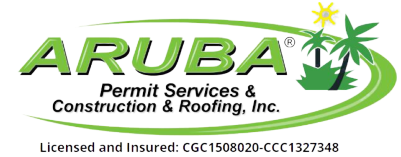FAQs
Aruba Permit Services
Have a permit-related question? Aruba Permit Services has the answer. Check out these FAQs and give us a call today for more information!
Why do cities require building permits?
Building permits are mandated by cities to ensure that construction adheres to all state, city, and fire prevention codes. Inspections are conducted on all issued permits to ensure the safety and well-being of citizens.
Is a permit required for my project?
Building permits are necessary for various projects including new commercial buildings, tenant build-outs, construction trailers, temporary power poles, new homes, mobile homes, room additions, and in-ground swimming pools. Many other projects also require permits, such as carports, fences, sheds, re-roofing, window and door replacements, above-ground pools, A/C change-outs, electrical and plumbing work, gas piping, generators, fire protection systems, and low-voltage wiring.
Starting projects without proper permits can lead to increased costs, delays, and potential removal of structures. The Florida Building Code, 6th Edition (2017), stipulates that permits must be obtained prior to construction, alterations, repairs, and relocations. Failure to do so may result in penalties of double the permit fee or $450, whichever is greater.
What type of work requires a permit?
Permits are required for a wide range of construction and modification activities. These include new construction, additions or alterations to existing structures, fences, driveways, parking lots, roofing, swimming pools, solar pool heaters, structural changes, signage, commercial awnings, irrigation systems, tree removal, land disturbing activity, as well as plumbing, electrical, gas, or HVAC work.How long does it take for a permit to be approved?
The approval process duration varies depending on the type of permit. For residential construction permits, the average approval or response time is five to seven working days. Commercial construction permits typically require 14 to 21 working days for approval. Fire system permits, such as those for alarms and sprinklers, generally take seven to 10 working days to be approved.Why is obtaining a building permit a benefit to me as a homeowner?
Obtaining a building permit offers several advantages to homeowners. It ensures that your project meets established minimum criteria through a review process, allowing for problem identification and correction before non-compliant work occurs. The process also verifies a contractor's license and insurance. Additionally, it provides for inspections by knowledgeable professionals to confirm compliance with minimum code requirements. Having proper permits can prevent delays in property transfers and avoid the risk of unsafe work. Unpermitted work may be subject to double permit fees and potential demolition.How much can permits cost?
The cost of building permits can vary significantly, ranging from a few hundred dollars for simple projects to thousands for large-scale endeavors. Permit costs are determined by several factors, including the project's size and complexity, the value of the work being done, additional permits required, and the time needed for application review and site inspections. Permit pricing often follows tiers based on the project's value. Application and inspection fees for custom homes may be twice as expensive as those for registered plans. The project's square footage also influences the cost, as larger areas require more extensive inspections. It's important to note that permitting fees and requirements can differ between municipalities.

Share On: